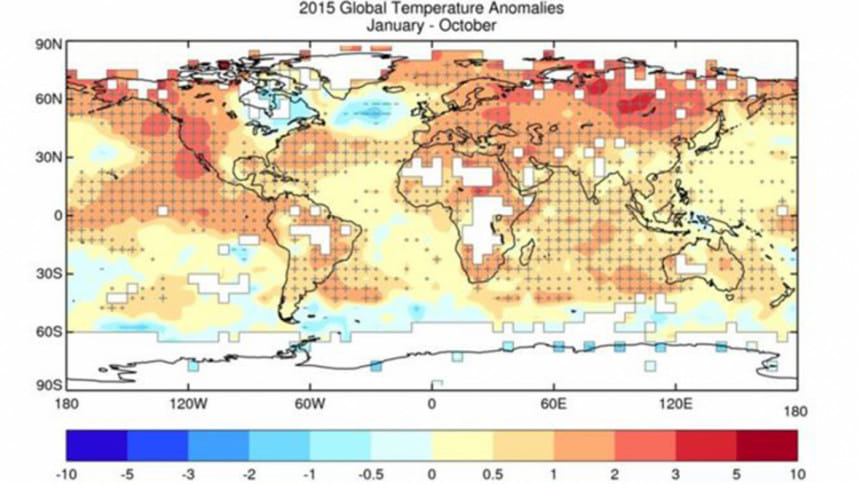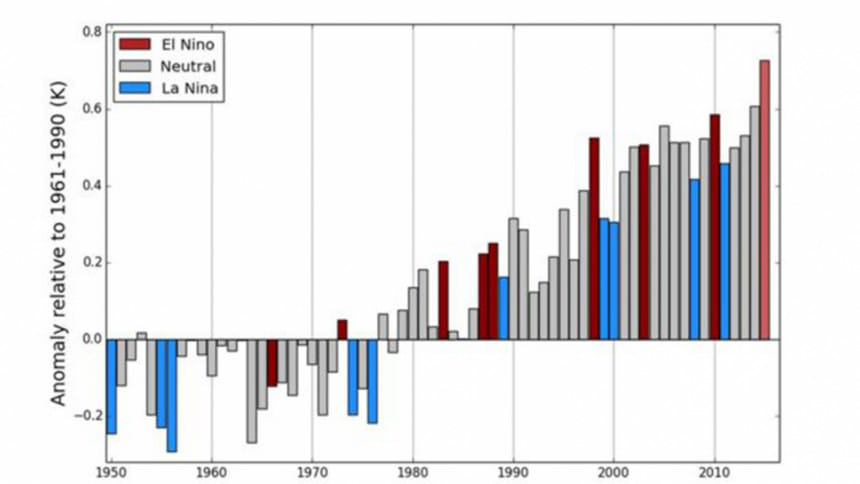2015 likely to be warmest on record

Global average temperatures in 2015 are likely to be the warmest on record, according to the World Meteorological Organisation (WMO).
Data until the end of October showed this year's temperatures running "well above" any previous 12 month period.
The researchers say the five year period from 2011 to 2015 was also the warmest on record.
The rise, they state, was due to a combination of a strong El Nino and human-induced global warming.
The WMO said their preliminary estimate, based on data from January to October, showed that the global average surface temperature for 2015 was 0.73 degrees C above the 1961-1990 average.
Their scientists also found that global temperatures were approximately 1 degree C above the 1880-1899 period, mirroring a recent finding by the UK Met Office.
'Bad news'
The record-breaking five year period from 2011 to 2015 was 0.57C above the average for 1961-1990.
The WMO said that levels of greenhouse gases in the atmosphere reached new highs. In the northern hemisphere, the spring of 2015 saw the three-month global average concentration of CO2 cross the 400 parts per million barrier for the first time.
"The state of the global climate in 2015 will make history for a number of reasons," said WMO secretary-general Michel Jarraud.
"2015 is likely to be the hottest year on record, with ocean surface temperatures at the highest level since measurements began. It is probable that the 1C threshold will be crossed.
"This is all bad news for the planet."

Other researchers agreed that the latest data from the WMO reinforces the view that human emissions of carbon dioxide, from burning fossil fuels, are continuing to heat the Earth beyond natural variability.
"The fingerprint of a warming planet is becoming clearer in nearly every corner of the world," said Dr Ed Hawkins, a climate scientist at the University of Reading.
"Moreover, 2015 is not a one-off, as indicated by the last five years' average also being the warmest on record.
"In the UK, our variable weather means that 2015 will not set any records for warmth, but the longer view shows UK temperatures have risen about 20% faster than the global average. We can expect this faster rate to continue in future."
As well as warming the land, much of the heat has gone into the oceans. The WMO said the waters have been absorbing more than 90% of the energy that has accumulated in the climate system from human emissions of greenhouse gases. The temperature of the tropical Pacific was more than 1C above average, consistent with a strong El Nino.
The WMO said this weather phenomenon has been a factor in pushing this year past previous records. El Nino has gained in strength over the past few months and has been rated as one of the three strongest since 1950.
The researchers said that the impact of an El Nino is typically felt more strongly in the second calendar year, meaning that 2016 is likely to be more strongly influenced by the event than 2015.
The record temperatures of 2015 were being felt in many different parts of the world. China recorded its warmest ever January to October period. For Africa, this year has been the second warmest on record.
Heat waves affected many parts of the world, with India seeing average maximum temperatures over 45C in some areas. There were also extremely hot periods in Europe, North Africa, the Middle East and elsewhere.
The WMO also argued that many of the extreme weather events in the past five years, especially those relating to higher temperatures, have had their probabilities substantially increased as a result of human-induced climate change.
The new findings are likely to feature prominently at COP21 in Paris next week, when global political leaders and negotiators will aim to secure a new global deal that would limit emissions of carbon dioxide.

 For all latest news, follow The Daily Star's Google News channel.
For all latest news, follow The Daily Star's Google News channel. 








Comments